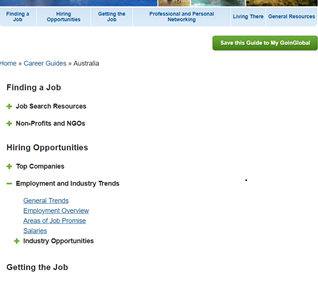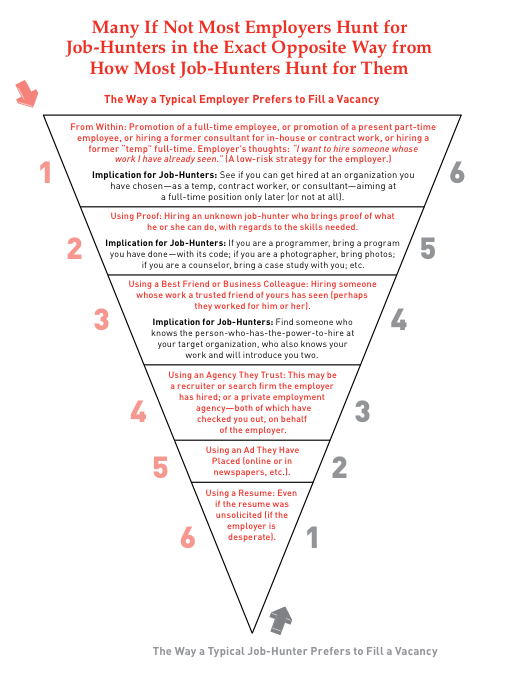Trying to find a good job in a different country can be difficult, especially if you have limits on your time and energy due to studying commitments. The following steps will help you focus on the most important actions in an organised way.
1) Be clear about what sort of job you want
Without a clear criteria of what you want in a job, it’s difficult to focus your efforts effectively. However, having a too narrow focus will limit your options so you may not find enough opportunities – instead of thinking purely about your first job after graduation, think about where you want to be in your personal and professional life in 5 – 10 years’ time, and consider what skills, experience and connections you need to achieve that. Use this as part of a criteria for deciding what sorts of jobs you wish to apply for now.
2) Understand the recruitment expectations and procedures of different countries
You can use the same resources on our Work Abroad page to become more familiar with recruitment processes and requirements in a different country if you are not already familiar with them, for example how CVs are formatted, etiquette at interviews. Speaking to people from that country can also help with us.
It’s essential to do this, as potentially you may waste time on applications that are being rejected because of small things you could change. You can also read our Marketing yourself to employers in your home country PDF.
3) Understand the labour market
You can visit Goinglobal to find out about employment trends in different countries by reading their Career Guides (you’ll need to log into the Careers Toolkit using your normal university login details, but won’t need to set up a private account on Going Global). This will help you understand what jobs and skills are most in demand and if there are likely to be many opportunities in your chosen field, all of which will help you make informed decisions about what opportunities to spend your time pursuing.

4) From the above information, identify potential employers
This will help you be more focused in your activities. You can use resources like Goinglobal and others from our Working Abroad page, as well as search engines (e.g. Google) to find companies that might interest you. You can also search In his book The 2-Hour Job Search, author Steve Dalton recommends making a list of 40 companies as this will encourage you to think creatively and widen your options to a suitable number beyond what is merely convenient. Put these into an Excel table. If you are focused, you can do this in a few minutes.
5) Rank the employers in terms of preference
Dalton also recommends putting all the employers in a table so you can rank them in order of preference for working at – LAMP:
L – List, completed in previous step
A – Alumni – quickly using LinkedIn.com/alumni (or for Lboro students, using Lboro Connect too), are there any alumni that work there? i.e. other people who have an Lboro connection that you could contact about working there (see (6) below). Dalton also includes anyone who would be sympathetic to your job search (e.g. someone you know already), even if they are not a literal alum of Lboro. At this you are simply writing ‘Yes’ or ‘No’, rather than alum details as doing so at this stage will slow you down.
M – Motivation – give a score of 1 – 5 how much you want to work there, based on what you currently know (don’t spend time doing extra research at this stage, as will add extra time unnecessarily).
P Posting – are there any opportunities available right now? Use www.indeed.co.uk to search (don’t click on job posting at this stage), and give each a score as follows:
Employer & Keyword (job title) – 3
Employer & No Keyword – 2
No Match – 1
You can vary this according to your circumstances, e.g. Employer & Keyword & Internship – 4
The key is to go through this as quickly as possible, working down ‘Alumni’ column, then ‘Motivation’, and then ‘Posting’, instead of working across doing A, M, P for one employer, then doing the same for the next. Dalton compares this process to how Henry Ford massively increased production in his car factories through introducing assembly lines, i.e. reducing a complex process to “individual, simple tasks increases efficiency and reduces the mental effort required. Focusing on a repetitive tasks may certainly be boring, but it gets tedious tasks competed quickly, effectively, and with minimal effort.”
Once you have prioritised your list, you can select which employers to focus your time on. Dalton recommends using the ‘Sort’ tool on Excel (under ‘Data’ tab) to order the list, based on a) top priority – Motivation b) second priority – posting c) third priority – alumni. When reviewing this list, if any companies are advertising at the moment and it makes you more motivated to apply for them, you can increase the motivation score. In addition, if any companies score lowly under Motivation but have postings or alumni you can spend a few minutes researching them (one minute maximum per employer) to see if they would potentially interest you – these employers may have low brand recognition, and so be more open to direct approaches from you.
6) Get contacting people
In line with the approach Dalton advocates, the organisation 80,000 Hours conducted extensive research into the most effective ways of finding jobs. Some companies (especially large ones) have standardised recruitment processes that everyone must follow, so you need to just follow these.
However, thinking about the recruitment process from an employer’s point of view, many people are more likely to recruit someone they know or has been recommended by someone they know. 
Taken from “What Color is your Parachute?” 2015 edition.
This means that rather than contacting people at companies directly to ask if they have any jobs, it’s more effective to build relationships with them. An effective way to do this is called informational interviewing, and involves you contacting people to ask for a few minutes of their time to find out more about working in that company/industry. If you are able to find Lboro graduates, often they are often more open to helping.
80,000 Hours have put together a series of email scripts that can be adapted to reach out to people at companies that interest you. You can send people personalised LinkedIn connections are do some research and find their email address.
If a company is currently advertising a vacancy you wish to apply for, if you have time you can adapt an email to someone at the company for their insight to help with your application. An adapted example from Dalton:
Subject: Loughborough Uni MBA student seeking your advice.
Dear Mr Jones,
My name is [….]. I am an Loughborough University MBA student who found your information on LinkedIn loughborough alumni page. May I set up a phone call with you to discuss your experience with [company]? Your insights would be greatly appreciated, as I am now in the process of applying for an open [job vacancy] position there.
I recognise that this may be a busy time for you, so if we are unable to connect by email I’ll try to reach you next week to see whether this is more convenient.
Thank you for your time
[Name]
Not everyone you reach out to will respond, but you can schedule 15-20 minute phone/Skype (or email) conversations with people at times that fit in with your schedule. Our Networking for career planning and job search pdf can help you with knowing what to say in this appointments.
Spending time building relationships so that people know you and potentially recommend you for opportunities will speed up your job search efforts and save you time in the longer-term.
Finally, you can book an appointment to get help with any of the above, should you so need it.
– Christian Jameson-Warren


